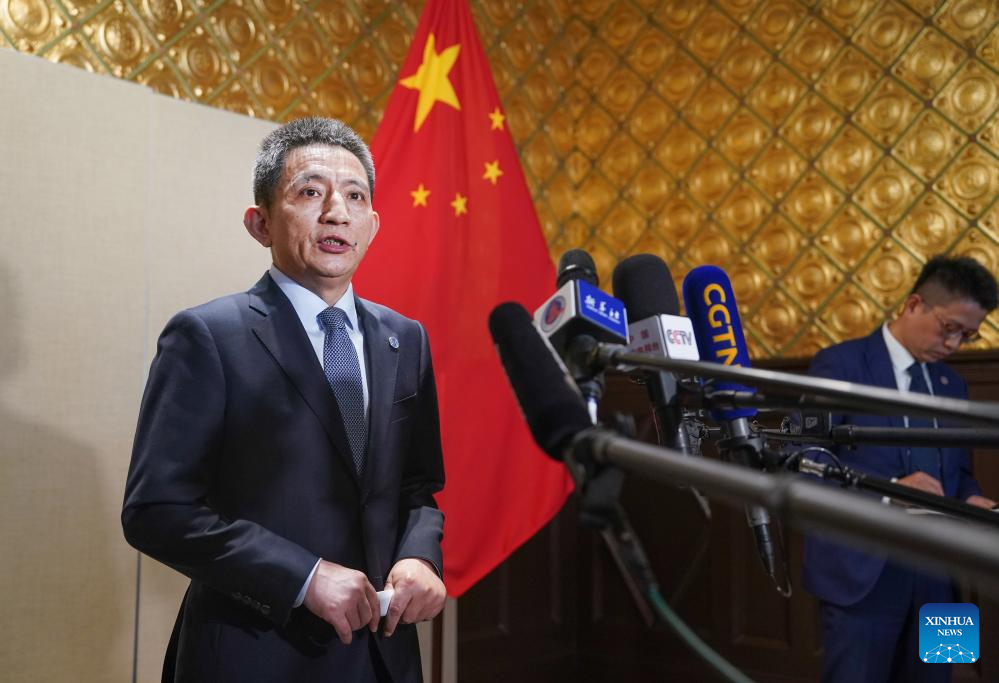Washington should work with Beijing for win-win outcomes, vice-premier says after trade talks

The United States should work with China to continue to enhance consensus, reduce misunderstandings, strengthen cooperation, further deepen dialogue and consultations, and strive for more win-win outcomes, Vice-Premier He Lifeng said in Sweden on July 29.
A stable, healthy, and sustainable China-US economic and trade relationship serves not only the two countries’ respective development goals, but also contributes to global economic growth and stability, he emphasized.
The vice-premier made the remarks during the new round of China-US economic and trade consultations in Stockholm, which were held on July 28 and 29 with US lead negotiator Treasury Secretary Scott Bessent and US Trade Representative Jamieson Greer.
Based on the meeting consensus, both sides will continue pushing for a continued extension — of 90 days — of the pause on 24 percent reciprocal tariffs of the US, as well as countermeasures by China.
Li Chenggang, China’s international trade representative with the Ministry of Commerce and vice-minister of commerce, said at a news briefing after two days of consultations that both sides were fully aware of the importance of safeguarding stable and sound China-US trade and economic relations, and the teams from both sides agreed to continue to maintain close contact on key issues of mutual interest.
US Treasury Secretary Bessent described the talks in Stockholm as “constructive”.
The latest round of economic and trade talks between the world’s two largest economies was the third in recent months. All the discussions were aimed at smoothing frayed trade relations and easing the triple-digit levies placed on each other’s goods earlier this year.
In May, the two sides agreed during talks in Geneva to a 90-day pause of the sky-high levels previously set for tariffs. US levies were then set at 30 percent on Chinese imports to the US, while US products to China were given a 10 percent tariff. As of July 29 evening, those rates remained in place.
In another development, Foreign Minister Wang Yi met with a delegation of the board of directors of the US-China Business Council, in Beijing, on July 30.
China hopes to strengthen contacts with the US to avoid misjudgment and manage their differences, Wang said, adding that Beijing will handle and develop its ties with the US on the principles of mutual respect, peaceful coexistence, and win-win cooperation.
On July 30, Commerce Minister Wang Wentao also met with the business delegation. Wang said that opening-up is China’s fundamental national policy, and the country’s door will only open wider.
Rajesh Subramaniam, board chair of the US-China Business Council, said the council welcomes the continued dialogue and positive outcomes achieved by the economic and trade teams of both sides.
Despite trade tensions between China and the US, the two economies remain deeply intertwined. The US market exhibits a strong dependence on China’s manufacturing sector that would be extremely costly for Washington to unwind, said Chen Wenling, former chief economist at the China Center for International Economic Exchange.
Economists and business leaders around the world are closely watching the next steps, as tariffs have caused widespread uncertainty in most industries.
David A. Gantz, an economist at the Baker Institute for Public Policy at Rice University in the US, said he believes that the specific tariffs will have a big effect on the global economy.
Li Yong, a senior fellow at the China Association of International Trade in Beijing, said that cooperation based on rules and consensus can help prevent the harm caused by unilateral sanctions and confrontation. Dialogue is the only right way forward, he emphasized.
Liu Ying, a researcher at Renmin University of China’s Chongyang Institute for Financial Studies, said that stable China-US business ties can help companies on both sides stabilize their expectations and better navigate uncertainties in the global market.
Wang Lingjun, vice-minister of the General Administration of Customs, said that the essence of China-US economic and trade cooperation lies in mutual benefit and win-win outcomes.
Wang Qingyun contributed to this story.
Contact the writers at zhongnan@chinadaily.com.cn


